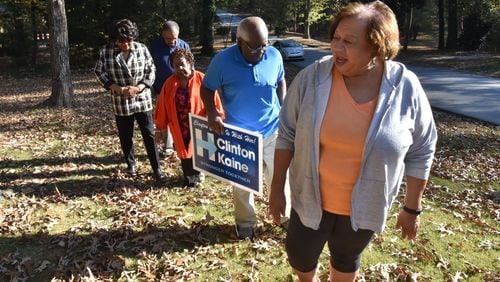Eighty-four percent of voters in Clayton County cast ballots for Hillary Clinton, the highest percentage of any county in the state. African-American voters were most loyal to Clinton nationally. That held true in Clayton, which is 69 percent African-American. Those voters thought they were backing a winner. Now they are pondering the meaning of Donald Trump's victory and what the future might hold.
Rex, Clayton County
Yvonne Dortch spent Tuesday night watching election returns at the hospital with her husband Andre. He is a cancer survivor and wasn’t feeling well.
In the waiting room, Yvonne Dortch’s heart sank with each state called for Donald Trump. She was a Hillary supporter, bothered by Clinton’s email controversy, but assuaged by Clinton’s apology. She is the mother of a soldier who earned a Purple Heart, but she also believed in the candidate who voted for the war in Iraq. She is a 51-year-old with a GED who didn’t resent Clinton’s ascension to Secretary of State, but was inspired by it.
And as each state went red, Dortch thought the nation might still be convinced of what she believed; that the candidate who wanted to keep Obamacare and fix it should be chosen as president.
All they would need to do was look at her husband.
For a long time, their family had no healthcare and her husband developed advanced prostate cancer. Yvonne Dortch had worked for 27 years for a contractor and doing remittance work for a bank, but the wages were low and now she was disabled. Her husband worked at a local grocery store, getting limited benefits. Even with no credit cards, nearly every month their bills exceeded their income. After signing up for Obamacare, payments their first year amounted to 12 cents. Her husband was able to have surgery that saved his life.
In Hillary Clinton, Yvonne Dortch saw a woman who would understand all that.
“The majority of people out here, we just trying to make it daily,” Yvonne Dortch said. “We ain’t trying to get rich. It’s about being able to pay your bills, buy gas for your car and every now and then, if you can afford it, go to the movies. She understands that.”
As Trump’s electoral tally grew, Yvonne Dortch was in disbelief. Yes, the emails and Benghazi bothered her but how could people overlook, unpaid taxes, bankruptcies, insults hurled at immigrants, a Gold-Star family and especially women? She takes pride in saying she’s not on welfare or food stamps. Yet she’s in the same financial pain as underemployed Rust Belt workers. So how could they come to such a vastly different conclusion about which candidate could make things better?
Sitting in her living room on Thursday she did not believe the president-elect’s assurances that he would understand her life.
“When he said yesterday, ‘The forgotten will never be forgotten again,’ I just don’t trust that because he don’t know what forgotten is,” Yvonne Dortch said. “If your daddy gave you a million dollars to get started and you never had to worry about money, you don’t know what forgotten is. If you never had to worry about what’s in your refrigerator, you don’t know what forgotten is.”
Riverdale, Clayton County
They never thought they’d see a black president. And Thursday was to have been a similar milestone, a day when the first African American president welcomed the first woman president-elect to the White House. The five of them, gathered in Vivian and Ivan Baldwin’s spacious family room, had voted with the hope of making it so.
But the television in the corner broadcast a different story, another moment they thought they’d never live to see. President Barack Obama shaking the hand of President-elect Donald Trump, a man who questioned Obama’s very citizenship. Vivian Baldwin suggested the group of mostly retirees move to the formal living room so they wouldn’t have to see what had come to pass.
All of them, the Baldwins, Bertha and Ronald Tivey and Emma Godbee are well over 60 years old, born during an era of poll taxes and literacy tests that kept many African Americans from voting. They’d lived to see the 1965 Voting Rights Act enacted, and lived to see a key part of it gutted by the Supreme Court almost 40 years later. But the quintet had not just persevered, but thrived. Among them were a government contractor, librarian, teacher and registered nurse. Godbee is still working as a financial advisor.
They thought Clinton would appoint a cabinet that looked like the nation. They saw her as experienced and prepared. Her debate performances proved it, in their eyes, as did her testimony during the Congressional hearings on Benghazi.
“She sat there for eleven hours, eleven hours and took it,” said Ronald Tivey, his voice building. “She didn’t give up! Hillary was my girl then. She had strength!”
To them, she had earned her turn. But the presidency is not won by popular vote.
“What kind of country are we living in when the people put someone like Trump in there,” Bertha Tivey said. “He’s everything bad that you want to think about.”
But it wasn’t Trump himself, they said they feared, but what he had unleashed by calling Mexicans rapists, promising to ban Muslims from entering the country and a pledge to restore “law and order.” In that language, the Baldwins and their friends heard an appeal to exclusion and violence. Their fears tumbled forth as they visioned what might come next. They glimpsed the spectre of what they’d already lived through.
“I’m afraid of the people he’s going to bring in. He’s going to bring in a lot of people who are not sympathetic towards us, ” said Ronald Tivey.
“Well, I’m afraid of white supremacy,” said Vivian Baldwin. “You’ll have more killing and shooting of us than ever before.”
“Yes,” her husband chimed in. “It’ll be more acceptable to rough us around. And all these cops are just going to go crazy on us.”
“And I’m really afraid for the Latinos because of what he said he’s going to do to them,” Vivian Baldwin said.
As her friends laid bare their dismay, Godbee sat listening, a grimace growing wider across her face.
“Maybe I have more faith in the country as a whole,” Godbee said. “I really don’t see us going backwards too much. They might attempt it, but I don’t see the country standing for that. They can’t just do anything they want to do. There are laws.”
Vivian Baldwin looked down at the half eaten tray of potato chips and onion dip on the glass coffee table as she considered her friend’s counter argument about the rule of law, the guarantees of the Constitution and the conscience of the nation. Then she looked directly at Godbee.
“You’re too trusting,” Vivian Baldwin said.
Rex, Clayton County
Every time Hillary Clinton said “deal me in” when she was accused of playing the woman card, Cathy Bonner, of Rex, felt as though she was sitting at the table with her, ready to play the game. She is a wife, mother of three adult children, a former substitute teacher, a homemaker, a breast cancer survivor and she wanted nothing more than to say ‘Madame President.’
“I thought Hillary would lift us up,” Bonner said. “I love to see a woman, I don’t care what color you are, I love to see them doing their thing and being empowered.”
The 48 year old tries not to judge women who didn’t want Clinton to be Commander-in-Chief, but she’s troubled by some numbers. Roughly 53 percent of white women voted for Trump. Ninety four percent of black women voted for Clinton. And in the realm of percentages, Bonner uses her own formula when picking a candidate. She doesn’t agree with any of them 100 percent, even President Obama. The best any voter can hope for is between 75 to 80 percent. Clinton was within Bonner’s margin. That the nominee was a woman put her closer to 80.
When she learned a slim majority of white female voters cast their ballots for Trump, she was stunned.
She’s fearful of the fate of legal abortion now that there will be a Republican Congress, White House and Supreme Court justices appointed by a Republican president.
“Telling a woman what to do with her body, that’s not your business,” Bonner said.
She has friends who were Trump supporters, and she tried to bring them to the table with Hillary. They are still her friends, but there is a gulf that must be bridged. She believes it can be, especially with the help of God. She just doesn’t know how.
“What is it I’m seeing they’re not seeing, and what is it they’re seeing that I’m not,” Bonner said. “And I still don’t have an answer.”







